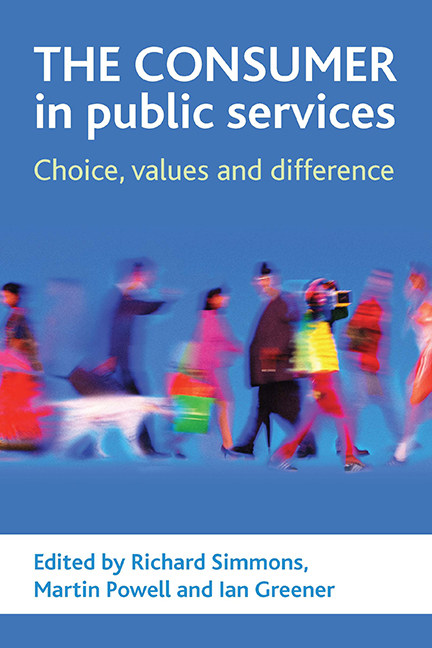Book contents
- Frontmatter
- Contents
- List of figures and tables
- Acknowledgements
- Notes on contributors
- Foreword
- one Introduction: managing the ‘unmanageable consumer’
- two The consumer and New Labour: the consumer as king?
- three Narratives of public service delivery in the UK: comparing central and local government
- four Understanding the ‘differentiated consumer’ in public services
- five Differentiating consumers in professional services: information, empowerment and the emergence of the fragmented consumer
- six The healthcare consumer
- seven The consumer in education
- eight The consumer and social housing
- nine The people’s police? Citizens, consumers and communities
- ten The consumer in social care
- eleven Differentiated consumers? A differentiated view from a service user perspective
- twelve Authoritative consumers or experts by experience? User groups in health and social care
- thirteen The public service consumer as member
- fourteen Conclusion: the consumer in public services
- Index
one - Introduction: managing the ‘unmanageable consumer’
Published online by Cambridge University Press: 22 January 2022
- Frontmatter
- Contents
- List of figures and tables
- Acknowledgements
- Notes on contributors
- Foreword
- one Introduction: managing the ‘unmanageable consumer’
- two The consumer and New Labour: the consumer as king?
- three Narratives of public service delivery in the UK: comparing central and local government
- four Understanding the ‘differentiated consumer’ in public services
- five Differentiating consumers in professional services: information, empowerment and the emergence of the fragmented consumer
- six The healthcare consumer
- seven The consumer in education
- eight The consumer and social housing
- nine The people’s police? Citizens, consumers and communities
- ten The consumer in social care
- eleven Differentiated consumers? A differentiated view from a service user perspective
- twelve Authoritative consumers or experts by experience? User groups in health and social care
- thirteen The public service consumer as member
- fourteen Conclusion: the consumer in public services
- Index
Summary
Introduction
The figure of the consumer has been central to New Labour's approach to modernising and reforming public services (Clarke, 2004; Clarke et al, 2007; Needham, 2007). However, both consumers and public services are problematic. First, it is possible to claim that government documents tend to see the ‘consumer’ in a narrow sense: the individual ‘consumer as chooser’ to use the term of Gabriel and Lang (2006). Choice is becoming the watchword of the ‘new’ public services (Le Grand, 2005, p 200). At the risk of some oversimplification (see later), commentators tend to associate choice or exit with economic consumers and voice with political citizens. The recent choice versus voice debate (eg Audit Commission, 2004; NCC, 2004; Office of Public Services Reform, 2005; PASC, 2005) clearly sees a role for both mechanisms. However, according to the Joint Memorandum from Ministers, The case for user choice in public services (2005, p 3):
Both theoretical and empirical evidence points to choice serving as an important incentive for promoting quality, efficiency and equity in public services – and in many cases more effectively than relying solely or largely upon alternative mechanisms such as ‘voice’.
However, Gabriel and Lang (2006, p 2) argue that the word ‘consumer’ is now so overused that it is in danger of collapsing into meaningless cliché, and that the consumer can mean all things to all people. They point to ‘the theoretical softness of the concept of the consumer’, and are ‘impatient with one-dimensional views’, claiming that it is time that different traditions of defining the consumer started to take notice of each other (pp 2, 3). In particular, they point out that one type – the ‘consumer as chooser’ – has monopolised the attention of writers (p 42), but many other ‘faces’ exist: the consumer as communicator, explorer, identity seeker, hedonist or artist, victim, rebel, activist and citizen.
Second, consumption of public services is more complex than consumption of private goods and services, because of the possible tension between efficiency and equity criteria, and individual and collective dimensions. Few would raise the problem of equity if some consumers did better than others in snapping up a bargain in a sale or negotiating a good discount in buying a new car.
- Type
- Chapter
- Information
- The Consumer in Public ServicesChoice, Values and Difference, pp. 1 - 18Publisher: Bristol University PressPrint publication year: 2009

